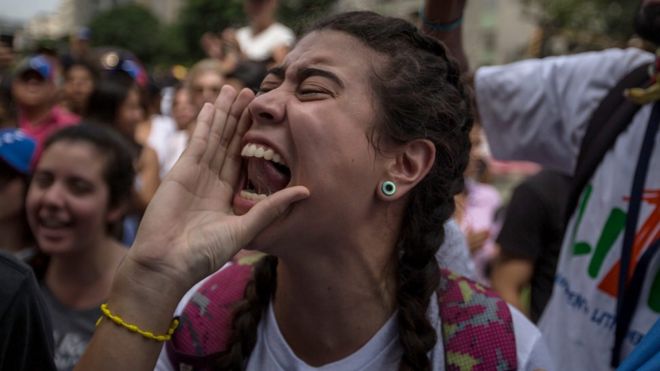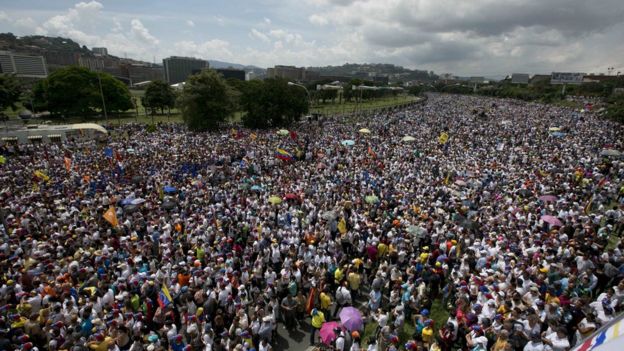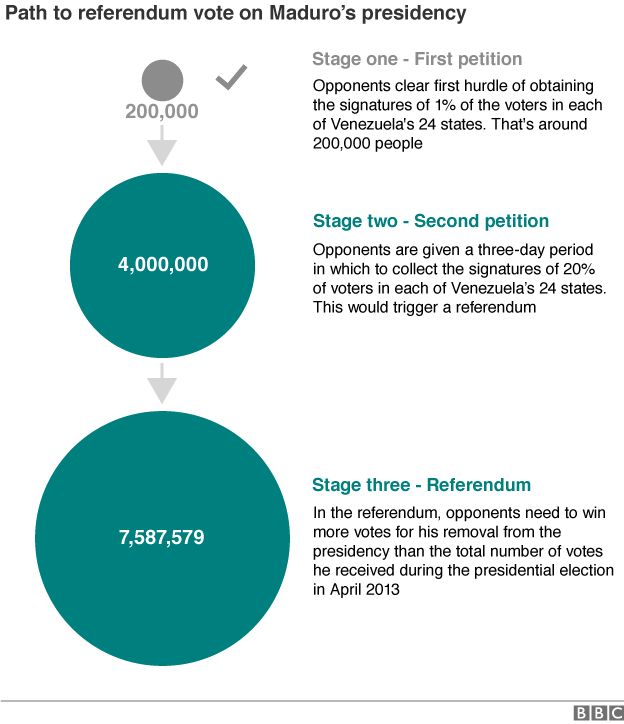- Thurs Oct 27, 2016 09H:00 GMT/UTC/ZULU TIME
- Latin America & Caribbean
 EPA
EPA
One policeman has been shot dead and dozens of people injured during anti-government protests in Venezuela.
At least 20 people have been injured and 80 detained nationwide, a local rights group has said.
Images circulated on social media of injured people on the ground. There are reports at least three were shot.
Hundreds of thousands of people took to the streets to protest against President Nicolas Maduro's government.
In Miranda state, a police officer died and two others were injured, the government said, blaming opposition activists.
Opposition leader Henrique Capriles is the governor of the state. Police there confirmed the death but did not blame protesters.
The mass demonstrations came after a recall referendum process - an attempt to remove Mr Maduro from power- was suspended.
Opposition activists had gathered about 1.8 million signatures petitioning for a recall referendum, 400,000 of which were validated by electoral authorities.
But the process was halted last week after officials said the signature collection process has been marred by fraud.
The country's opposition-led parliament voted on Tuesday to open a trial against Mr Maduro, whom MPs accuse of violating the constitution.
Protesters clashed with security forces across the country, particularly in the western cities of San Cristobal and Maracaibo.
"The referendum was our constitutional right, and they have denied it. What are they scared of?" said Grimaldi Lopez at the rally in the capital, Caracas.
Using the hashtag #TomadeVenezuela or "Venezuela takeover", people shared images of injured and bloodied protesters.
Alfredo Romero, leader of a human rights NGO, tweeted a picture of an injured 79-year-old woman, and said more than 20 people had been injured in the city of Merida alone.
Mr Maduro addressed a rival rally of supporters in Caracas, saying: "Let the people decide."
Opposition leaders have called for a mass walk-out on Friday. After the general strike, if the government continues to block the recall referendum process, the opposition threatened to march on the presidential palace - something it has not been allowed to do since a march there in 2002 started a short-lived coup against the former President, Hugo Chavez.
Mr Maduro, a former bus driver and union leader, is blamed by the opposition for Venezuela's dire economic situation. The oil-rich country is facing widespread food shortages and spiralling inflation.
In turn, he has accused the opposition of having links to foreign states, the US in particular, and of seeking to overthrow him to "lay their hands on Venezuela's oil riches".
 AP
AP
Under Venezuela's constitution, a recall referendum can be held once a president has served half of his term in office and the requisite steps are met.
So far, the opposition has completed the first step of the process.

- Venezuela political foes 'to hold talks' in surprise move
- Venezuelans protest after quashed referendum
- Venezuela's Maduro recall referendum drive suspended
- Venezuela election delay sparks opposition anger
- Venezuela referendum: Court tightens rules on Maduro recall
- Venezuela crisis: Jobless and hungry in industrial city of Valencia
- Venezuela crisis: Caracas hospital shows sorry state of health system

No comments:
Post a Comment